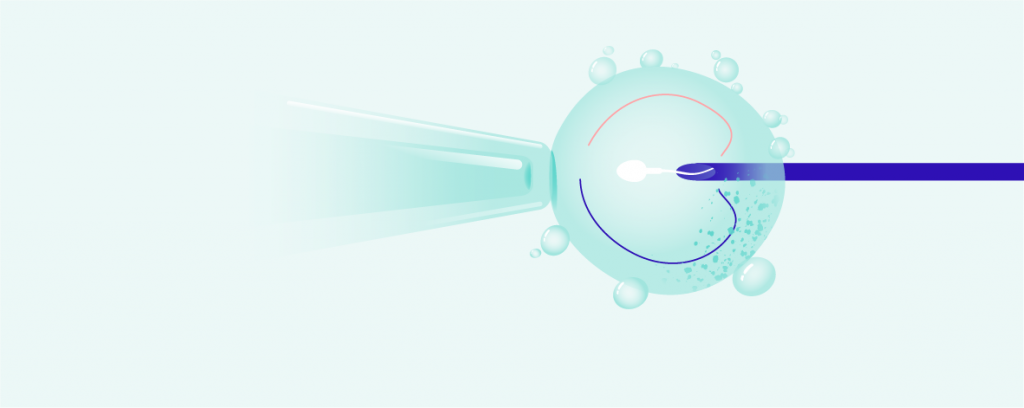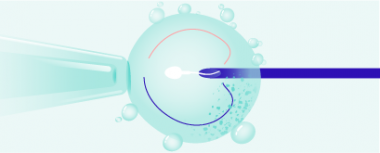Používáte nepodporovaný, zastaralý internetový prohlížeč. Stránky v něm nemusí být správně zobrazeny, mohou být pomalé a nemusí správně fungovat. Zaktualizujte si prohlížeč nebo si nainstalujte nový. Doporučujeme použití některého z následujících prohlížečů: Google Chrome, Edge, Mozilla Firefox


ICSI: injection of sperm directly into the egg
ICSI (intracytoplasmic sperm injection) is a method that significantly increases the chance of fertilisation. This involves the injection of sperm directly into the egg.
Book a consultationWhen is this method indicated?
For infertile couples
- When previous in vitro fertilisation has failed
- For couples with an unclear cause of infertility
- When using frozen sperm
- When using sperm obtained surgically (MESA/TESE)
In case of female infertility
- When infertility is due to an immunological factor
- On retrieval of a small number of eggs
- When using donated eggs
In case of male infertility
- In case of testicular disease or cancer
- In case of a low sperm count
- In case of low sperm motility
- In case of abnormal sperm shape
- If an obstacle prevents sperm from entering the ejaculate (e.g. vasectomy)
- In case of azoospermia

State-of-the-art technology
We use the latest, ultrafine needle to puncture the egg for fertilisation in order to spare the ovaries thus reducing the potential risk of postoperative complications. We are constantly striving to increase the quality of treatment.
More about our technologiesThe popularity of ICSI continues to grow
90% of couples at the clinic would like to use this method, even if the man has normal semen analysis results. Using ICSI, we are able to minimise interruption of the cycle because eggs are not fertilised using the “classic or conventional IVF” method, where the egg is fertilised with sperm in a culture dish spontaneously.
The ICSI methodExperience with the ICSI method
ICSI is a long-proven method that was first used by doctors at the Brussels University Hospital in 1991. The first woman in the Czech Republic became pregnant thanks to IVF/ICSI in 1995. Today, this method is widely used throughout the world, as evidenced by ESHRE (European Society of Human Reproduction and Embryology) registers, which monitor the use of individual techniques in European countries.
So far, no studies have shown any difference in the psychomotor development of children born after ICSI and children born from spontaneous conception. Based on current knowledge, it can also be said that the fertilisation of eggs using ICSI does not increase the risk of delivering a foetus with a congenital defect compared to pregnancies following spontaneous fertilisation.
Book a consultation and we’ll see how we can help
Other laboratory methods
EmbryoScope
We can increase the chances of pregnancy by selecting only the best quality embryos for transfer. We can identify these through continuous monitoring in EmbryoScope.
More informationPESA/MESA/TESE
In the absence of live sperm in the ejaculate, there is the possibility of obtaining sperm surgically from the epididymis (PESA or MESA) or testis (TESE).
More informationEmbryoGen / BlastGen
EmbryoGen and BlastGen are sequential culture media meticulously engineered to closely emulate the natural developmental progression of embryos.
More informationAssisted hatching
This method is used to disrupt the protective envelope (outer shell) of the embryo in order to make it easier to implant (nest) in the uterus.
More informationPGT
Testing the genetic makeup of embryos before transfer to the uterus reduces the risk of birth defects.
More informationMethods of infertility treatment
IVF with egg donation
If a woman cannot conceive and her partner's sperm are healthy, we use donor eggs fertilised with the partner's sperm.
More informationIVF using donor embryos
Donated eggs and donated sperm are used for in vitro fertilisation.
More informationIVF using donor sperm
For couples who cannot conceive naturally and the woman's eggs are healthy, we can use donor sperm from a suitable anonymous donor to fertilise the eggs.
More informationIVF using own eggs
We recommend IVF if the couple cannot conceive naturally.
More information




